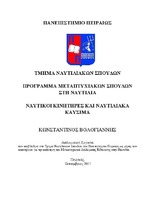Ναυτικοί κινητήρες και ναυτιλιακά καύσιμα

Προβολή/
Λέξεις κλειδιά
Πετρέλαιο ; Κινητήρες μηχανών πλοίων ; Οξείδια πετρελαίου ; Διεθνής σύμβαση MARPOL ; Περιοχές ελέγχου εκπομπών ρύπων ; Φθορές κινητήρων ; Καταλυτικά σωματίδια ; Εναλλακτικές μορφές ενέργειας ; Oil ; Motor engines ; Petroleum oxides ; MARPOL International Convention ; SECAs ; Engine damage ; Catalytic particles ; Alternative energy typesΠερίληψη
Σήμερα, από τους ισχυρούς κλάδους της βιομηχανίας μιας χώρας θεωρείται η ναυτιλιακή της βιομηχανία. Με τον όρο αυτόν εννοούνται όλες οι δραστηριότητες που συνδέονται και υποστηρίζουν τις θαλάσσιες μεταφορές ανθρώπων και αγαθών. Η κίνηση όλων των τύπων των πλοίων προέρχεται από το εγκατεστημένο σύστημα πρόωσής τους, όπου στην πλειονότητα χρησιμοποιούνται κινητήρες εσωτερικής καύσης, ενώ πρωταρχικό καύσιμο για τη λειτουργία των κινητήρων και συνεπώς για τη κίνηση των τύπων πλοίων θεωρείται το πετρέλαιο. Σε αυτήν την εργασία θα γίνει εκτεταμένη αναφορά και αναλυτική μελέτη των κινητήρων που χρησιμοποιούνται στα πλοία είτε για μέσο πρόωσης είτε για μέσο παραγωγής ηλεκτρικής ενέργειας, καθώς επίσης και των τύπων πετρελαϊκών καυσίμων που χρησιμοποιούνται σε αυτούς. Επιπρόσθετα, θα περιγραφούν και άλλοι τύποι κινητήρων πλοίων, ενώ θα υπάρξει αναφορά στους τύπους πετρελαϊκών ναυτικών καυσίμων που χρησιμοποιούνται και στα ποιοτικά χαρακτηριστικά του πετρελαίου που πρέπει να λαμβάνονται παντα υπόψη. Στην συνέχεια γίνεται αναφορά στους τοξικούς ρύπους, τα επικίνδυνα οξείδια που εκπέμπονται από τους ναυτικούς πετρελαιοκινητήρες, στις συνέπειες τους και σε τρόπους αντιμετώπισης τους κάνοντας ιδιαίτερη αναφορά στη διεθνή σύμβαση ΜARPOL για την περιβαλλοντική προστασία και στις περιοχές ελέγχου εκπομπών ρύπων (SECAs). Mετα περιγράφονται τα προϊόντα διύλισης του αργού πετρελαίου καθώς και οι φθορές που προκαλούνται σε κινητήρες πλοίου από συστατικά του ναυτικού πετρελαίου και προϊόντων καύσης του (π.χ. οξείδια). Ιδιαίτερη μνεία γίνεται για τα καταλυτικά σωματίδια (Catalytic Fines) που προστίθενται στο ναυτικό πετρέλαιο και προκαλούν φθορές. Τέλος περιγράφεται η σημασία της ασφάλισης σήμερα στη ναυτιλία. Μεγάλης ανάγκης θεωρείται η αναζήτηση νέων τρόπων και η αξιοποίηση εναλλακτικών μορφών ενέργειας για τη πρόωση πλοίων με σκοπό την αποφυγή καύσης του ρυπογόνου πετρελαίου.


